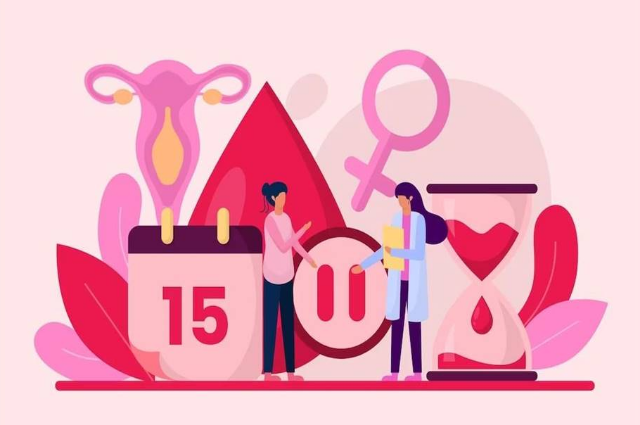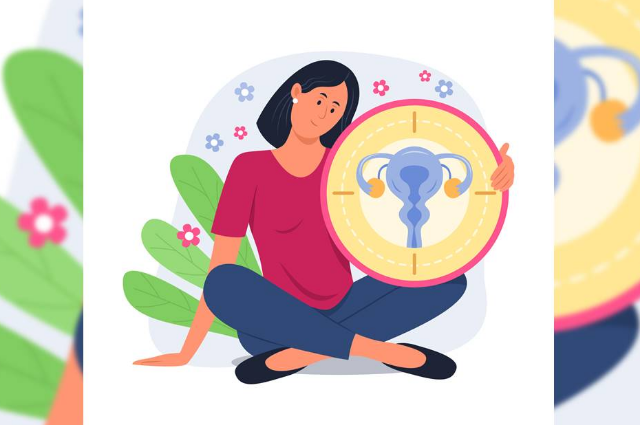Introduction
In the Western world, menstruation is a routine aspect of daily life for most women. However, in India, it can significantly disrupt the lives of women throughout their menstrual cycle. There are numerous cultural taboos related to menstruation in India, causing women to deviate from their regular routines. Even discussing menstruation is considered taboo due to the potential for societal shame, resulting in limited awareness and knowledge. This absence of information subsequently contributes to inadequate menstrual hygiene, causing long-term physical and psychological effects on girls and women. To address this problem, it is imperative to eliminate the social stigma associated with this natural bodily process through educational efforts, advocacy, and activism.
Menstruation represents a recurring phenomenon, and during the whole of a woman's menstrual lifespan (spanning around 35 to 40 years), she has to face the socially dictated behavioral norms influenced by a socio-cultural context. These norms aim to establish equilibrium among her diverse societal roles. The current role of women has experienced significant transformation. They have transitioned from the traditional homemaking responsibilities of the past to actively participating in a range of economic endeavors within both structured and unstructured sectors. In the region of Assam, where females constitute 48.81 percent of the overall population, 32.9 percent of them are categorized as active workers.
History of Menstrual Taboos
As per Jane Ussher, a Women's Health Psychology Professor at Western Sydney University, there exists a lengthy history of menstrual taboos spanning nearly all societies, and these taboos persist in subtle and intricate manners. According to many, these stigmas associated with menstruation represent a type of misogyny. The origins of menstrual taboos are still a subject of debate. Freud proposed that it stemmed from our fear of blood. On the other hand, Allan Court argued that the taboo emerged partly due to the belief that early humans perceived menstrual blood to negatively impact organic substances. In 1972, Anthropologist Shirley Lindenbaum put forth the theory that this taboo served as a means of natural population control, by restricting sexual contact due to the stigma of "pollution."
The societal stigmas surrounding menstruation result in perceiving the menstrual process as something to conceal, imbued with shame. Because menstruation is still predominantly seen as confidential women's affairs, young girls are instructed from an early age to handle it in a private and unnoticeable manner. Consequently, these menstrual taboos can give rise to significant challenges in managing menstruation, adverse reproductive health consequences, social isolation, and illness. Common misunderstandings associated with menstruation as per the WASH survey are as follows:
- Instead of using sanitary pads, opt for clothes.
- Refrain from consuming rice during menstruation.
- Avoid taking pain relievers, as they could have enduring impacts on the body.
- Stop consuming fruits, as they might induce cold and lead to disturbance of blood flow.
The significant transformations that come with the start of puberty, encompassing both emotional and physical aspects, hold importance for every young girl as she progresses into womanhood. Nevertheless, when these changes coincide with societal discrimination, insufficient menstrual hygiene, and inadequate self-care – all of which contribute to health issues and complications among this age group – the potential repercussions on their developing minds and general well-being can be notably adverse. Among the problems that may arise are urinary tract infections, vaginal scabies, unusual abdominal discomfort, school absenteeism, and pregnancy-related complications.
Strong stigmas around periods: issues and problems under it
A recent survey conducted by UNICEF, the United Nations' child protection agency revealed that 71% of adolescent girls in India are not informed about menstruation until they experience their initial menstrual cycle. Upon reaching this milestone, many of them discontinue their education.
Furthermore, a separate report published in 2019 by the NGO Dasra highlighted that approximately 23 million girls abandon their schooling each year due to inadequate facilities for managing menstrual hygiene. These facilities encompass the provision of sanitary pads and education regarding menstruation. Experts in public health and various non-governmental organizations (NGOs) focusing on this issue also emphasize the absence of fundamental amenities like access to clean water and restroom facilities. Additionally, they underline the presence of societal taboos, harassment, and stigmatization as contributing factors.
Social marginalization and inadequate education about menstrual hygiene are compelling numerous young girls in India to leave their schools prematurely or face isolation during the entirety of their monthly menstrual cycle. This tradition persists extensively in various regions of India's rural states, where a deficiency in understanding and information concerning menstrual hygiene is widespread among school-going girls.
On a global scale, over 500 million females face a lack of proper facilities for managing menstrual hygiene. Insufficient knowledge regarding sanitation and hygiene amenities, especially in public settings such as schools, workplaces, or healthcare centers, can present a substantial barrier for females.
In many households even today, women's autonomy remains constrained by patriarchal rhetoric. Despite cultural shifts, there has been minimal alteration in society's perceptions and attitudes toward menstruation. Within certain families, menstruation is still viewed as impure or uncomfortable, extending this perception to conversations about menstruation, both publicly and privately. Many girls even conceal themselves due to fear or shame when heading to a pharmacy; moreover, a significant number of them cannot afford to purchase sanitary pads for proper hygiene.
Methods to Combat Menstruation-Related Myths
Based on the existing evidence, it's crucial to adopt a strategic approach to address misconceptions and societal norms linked to menstruation. This is essential for enhancing the reproductive well-being of young girls and women. The primary tactic involves educating adolescent girls about menstrual health and hygiene. Often, young girls lack comprehensive knowledge about menstruation due to the reluctance of their mothers and other women to openly discuss these matters. Adult women themselves might not possess accurate biological information or proper hygiene practices, leading them to pass down cultural taboos and limitations. Implementing community-based health education campaigns could be effective in accomplishing this objective. Additionally, it's important to raise awareness among school teachers about menstruation.
Promoting women's empowerment through education and enhancing their involvement in decision-making can contribute to this objective as well. Frequently, women and girls are marginalized from decision-making processes due to their comparatively lower levels of literacy. Enhancing the educational attainment of women significantly contributes to enhancing the overall health of the community and specifically addressing cultural taboos. Ensuring the accessibility of sanitary pads and appropriate sanitation and washing facilities is also essential.
Low-cost and good-quality sanitary pads can be produced and provided within local communities, particularly in rural and slum regions where access to such products is challenging. The Government of India has sanctioned a program aimed at enhancing menstrual hygiene for 1.5 Crore adolescent girls through the distribution of affordable sanitary napkins in rural areas under the National Rural Health Mission, starting in 2010.
Nevertheless, the initiative is currently in the experimental stage, and there's a significant amount more to accomplish in this aspect. It's also important to involve male partners and address their belief systems to effectively challenge deep-seated social norms and cultural taboos. Men and boys often possess even less knowledge, but they must comprehend menstruation so they can provide support to their wives, daughters, mothers, students, employees, and peers.
Promoting the intake of vitamins and minerals to support a healthy menstrual cycle
The process of menstruation leads to the discharge of blood, resulting in the depletion of blood, bodily fluids, and essential nutrients for many women. Some may experience reduced appetite, leading to periods of hunger and malnutrition. To address this, experts have suggested the incorporation of vitamins, folic acids, and minerals as a means to replenish lost nutrients and sustain overall well-being. Generally, the utilization of dietary supplements such as vitamin B, vitamin D, folic acid, iron, and Omega-3s serves as an effective strategy to maintain adequate nutrition during menstruation.
Moreover, menstruation exposes women and young girls to infections, particularly those lacking proper hygiene practices. Therefore, the prudent utilization of supplements and nutraceuticals can enhance the immune system's ability to combat such infections. The global consumption of vitamins has witnessed a notable increase in recent times, and this surge is quite understandable. The demand has grown so significantly that analysts have predicted a substantial expansion in the global vitamin supplements industry, expecting it to rise from $47.9 billion in 2021 to approximately $98.6 billion by 2031, with some regions experiencing double-digit growth, including the United States.
Case study of Kerala: To Defeat Stigmas of Menstruation Taboos
Kerala is recognized as one of the most educationally proficient states in India and boasts the lowest gender disparity rate. Currently, it is striving to become the first Indian state to eliminate the use of sanitary pads. A recent development is the initiation of "Project Thinkal" by the Alappuzha Municipality in Kerala, which aims to promote the adoption of menstrual cups as an eco-friendly alternative to non-biodegradable sanitary pads. The government's initial phase of the project involves distributing 5,000 menstrual cups.
The initiative was initiated to address the issue of non-biodegradable plastic waste from sanitary pads. In a collaborative effort, the municipal body partnered with HLL Lifecare Limited, the manufacturer of the cups. The funding for the project comes from the CSR Initiative of Coal India Ltd (CIL), a state-owned enterprise. The government asserted that this initiative would not only decrease the environmental carbon footprint of the state but also offer women a more sanitary method to handle their menstruation. Taking a step further to promote safe menstrual practices, the Kerala government planned to survey to identify areas needing improvements, as part of their commitment to provide sanitation facilities for women in residences and schools.
Urinary tract infections and other fungal ailments are prevalent among young females if they fail to uphold proper hygiene during their menstrual period. The workshops also sought to influence a transformation in the social conduct of girls by eradicating the stigma associated with menstruation and instructing them in healthful practices.
Kerala has also gained recognition for conducting considerable discussions regarding the implementation of a policy for granting leave during menstruation. The government has taken a strong position in adhering to such leaves, as they anticipate that this move will establish a more comprehensive and comfortable atmosphere for women in workplaces. Kerala stands as the sole state where a Government Girls School in Tripunithura, located in the Ernakulam district, granted students the option to take menstrual leave during their annual examinations as early as 1912 and allowed them to complete the exams later on.
Legal fraternity initiative by being sensitive toward Menstruation
On a recent occasion, Chief Justice of India (CJI) DY Chandrachud emphasized the value of workplace flexibility and discussions about menstruation health.
CJI Chandrachud emphasized the significance of openly deliberating about matters related to menstrual well-being within the legal fraternity, asserting, "It is essential that we partake in such discussions. We need to recognize the presence of these concerns in our society."
He went on to reveal that in the previous year, among a total of five law clerks, four were females. It is a frequent occurrence for them to communicate with him regarding their menstrual discomfort. Honorable CJI permits them to work remotely and gives importance to their health. Furthermore, even feminine hygiene product dispensers in the women's restrooms had been installed at the Supreme Court of India.
Similarly, in various workplaces, the same rules and regulations can be implemented where women can be allowed to have leaves in case of the Menstruation Cycle and this will help them in prioritizing their health over work.
What is India's position regarding policies related to leave for the menstrual cycle?
Menstrual leave policies encompass rules that enable employees or students to have a break while menstruating, often due to pain or unease. Menstrual leave policies entail guidelines that provide women with the opportunity to take a break from their professional or academic responsibilities while experiencing their menstrual cycle. These policies are designed to acknowledge the difficulties that can arise from menstruation and grant women essential time off to address their health and overall wellness. For example, in 2020, Zomato introduced a policy granting 10 days of paid period leave annually. Following this, Swiggy and Byjus also implemented similar policies.
There has been an increasing discussion regarding menstrual leave regulations in India. A few companies have made the first move in implementing such policies, recognizing the difficulties that menstruation can bring about for women working in offices.
Efforts to propose menstrual leave legislation in Parliament have been made, but they haven't been fruitful thus far. In 2017, the Menstruation Benefits Bill was brought forward, and in 2018, the Women’s Sexual, Reproductive, and Menstrual Rights Bill was introduced. These bills sought to guarantee women's access to menstrual health products and the right to take menstrual leave. Unfortunately, both bills were not approved.
Conclusion
The cultural and mythical roots of the stigma associated with menstruation in India are deeply ingrained, but that doesn't mean change is unattainable. Many girls and women have faced challenges related to menstruation for years, along with their associated burdens. However, women are now utilizing social media to enhance awareness and advocate for change. There's a consensus that increased education and subsequent discussions can normalize conversations about menstruation. While comparing the stigma to a stubborn bloodstain, it might be tough to eradicate, but not impossible. With a bit of online research seeking advice from experienced elders, and some concerted effort, that stain can be eliminated. If collective efforts are directed towards changing the cultural narrative, beginning with self-transformation, the mental and physical well-being of women will improve. Consequently, women will attain greater equality and independence in Indian society.
Moreover, in the majority of Indian schools providing health education, it's common for regular school teachers to be in charge of these classes. However, it's recommended that individuals specially trained for this purpose handle health education. When extensively skilled health educators are introduced into schools to teach health, there's a higher probability that they will deliver accurate information to students, avoiding any biases or personal beliefs. These professionals would be more adept at addressing topics such as menstruation and menstrual hygiene.
References
- https://www.ijlmh.com
- https://www.youthkiawaaz.com
- https://www.google.com/
- https://www.dw.com
- https://www.thehindu.com
- https://timesofindia.indiatimes.com
- https://medium.com
- https://www.vantagefit.io
- https://www.scconline.com




